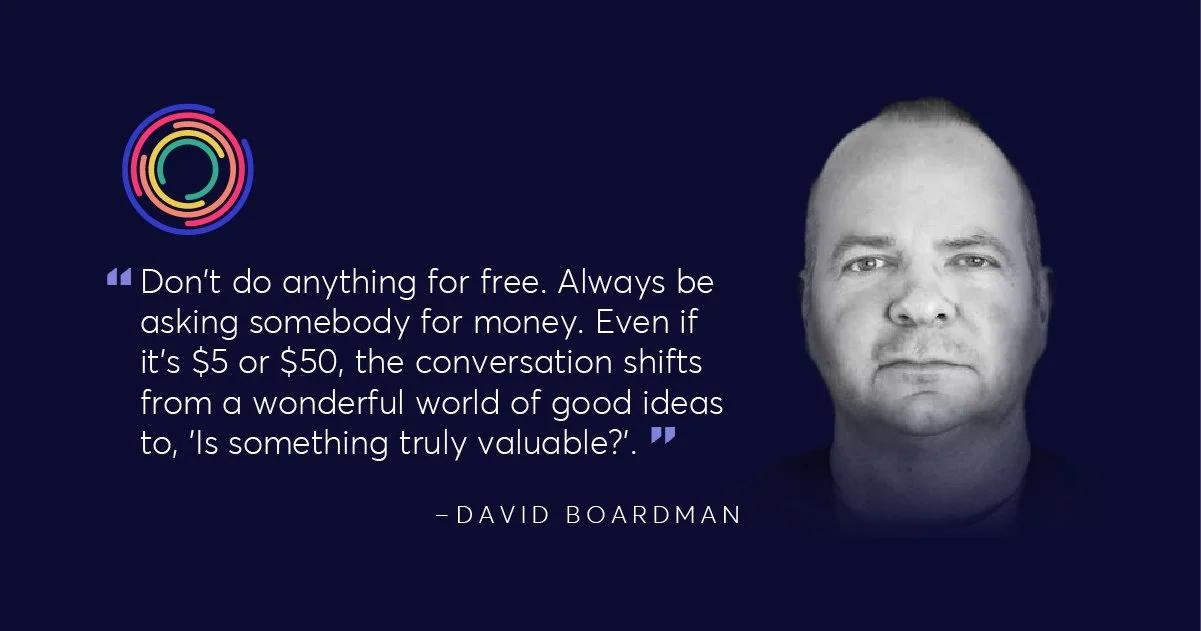EO Charleston Member Spotlight: David Boardman
Finding success as an entrepreneur requires a vision, a passion and a drive to be the best in your field. It often requires you to think outside the box and accomplish your goals in ways no one else has before.
And sometimes, it means getting your hands dirty…literally.
David Boardman does all that and more with his business, EveryPoint, a company with the vision of digitizing every point on the planet.
A Man Walks Into a Bar
“I’m a creator and a doer,” Boardman said, describing his professional approach.
Coming out of Purdue University with a master’s degree in computer science, this entrepreneur felt he didn’t fit the mold of the corporate world from the start of his career. But as a doer, Boardman didn’t allow this feeling to detract from his pursuits. Instead, he jumped into working on large-scale projects with the Hewlett-Packard Company (HP).
“It was a phenomenal experience,” Boardman said. “But it was just constraining. I was somebody who wanted to have a greater voice and a vision for what was possible in technology.”
With this realization, Boardman left HP after 10 years and opted to become an entrepreneur.
“Having learned all those entrepreneurial lessons, I feel like I got this one right,” Boardman said of his latest venture.
While EveryPoint wouldn’t be created for another nine years, its vision of a digitized Earth began (like many other great ideas) in a bar.
“There were a handful of us sitting in a bar talking about this technology, what it was capable of and where it was going to go,” Boardman said. “As we were looking out of the window of the bar, the whole world just turned into a set of pixels. That’s when the conversation shifted.”
This was around the time cameras started becoming commonplace, with surveillance systems more prevalent in Downtown Redmond and iPhones growing more popular.
“We started imagining where the future was going with all of this imagery and how you can take that imagery and turn it into 3D data,” Boardman said. “That intersection outside the bar, you could completely envision that the whole thing is going to be digitized, indexed and analyzed every second of every day. It’s just a question of when.”
One Small Step at a Time
With the grand goal in mind, EveryPoint openly declared its bold goal. Boardman said that while the big picture was in motion, he used his entrepreneurial experience to start small.
Their way of doing it? Measuring piles of stuff. Dirt. Debris. Anything that’s a pile gets measured and digitized with the goal of solving financial fluctuations in the bulk material industry.
“Think of how many piles of stuff you pass on a walk,” Boardman said. “The average person sees those piles and sees them as nothing more than dirt. But if you’re in the dirt business, that pile could be worth $40,000. Our global enterprise customers measure more than $1B of bulk assets each month.”
By using digitization to measure these piles, EveryPoint helps businesses that produce and use bulk materials manage financial risk by verifying what they have and where it is. And the imagery and data collected in measuring stockpiles helps train EveryPoint’s algorithms to be ready for the big project of digitizing every point on the planet.
“The way to achieve that big vision is to take it one small step at a time,” Boardman said. “You can have a huge vision, but the market might not be ready for it. It’s all about market timing.”
Boardman says his team is in the awkward post-startup and pre-scaleup stage. EveryPoint hasn’t accepted any outside capital and opts to use the “bootstraps” approach to find a market-fit product and grow off its own revenue.
The Tech Takeover
Like any tech-based company, technological advances have impacted EveryPoint’s testing but haven’t affected its goals.
“The vision hasn’t changed,” Boardman said. “It’s only a matter of time before people are capturing 3D models of everything in their world. It’s happening, so those big consumer tech companies are going to digitize every point on the planet eventually.”
While these companies seem to cater to consumer usage, Boardman says EveryPoint seeks to cater to the enterprise and digitize the world for businesses.
“What you can do on the iPhone now is mind-blowing,” Boardman said. “We’re now measuring in real-time with our algorithms on an iPhone. People are measuring piles of stuff in Mongolia, Fiji, Japan and here in South Carolina. They’re out measuring these piles because it’s now so easy to download an app, walk around something and get an answer.”
Boardman says the future of EveryPoint won’t be the ideal straight and narrow path, but it will drive them to keep working toward its ultimate goal. With that, he also has his own words of advice for future entrepreneurs.
“Don’t do anything for free,” Boardman said. “Always be asking somebody for money. Even if it’s five dollars or fifty dollars, the conversation shifts from a wonderful world of good ideas to ‘Is something truly valuable?’”

